Breaking News from the G20 Summit: The Presidential Gang Sign Is Back
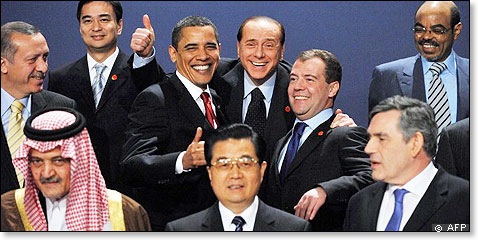
Also seen in the above picture giving the PGS is Italy’s Prime Minister, Silvio Berlusconi.
Sadly, look at poor Russian President Dmitry Medvedev on the far right:
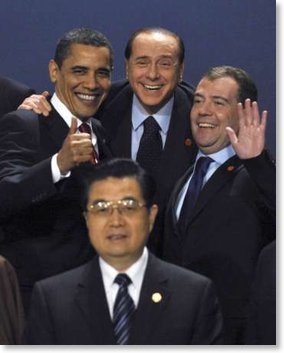
Obviously, he’s not a full member yet.
What? You aren’t familiar with the Presidential Gang Sign? Well then, click here to read my post on the subject dating all the way back to 2004.
Election Day
No, I’m not going to tell you who that candidate is. Such things are strictly between me and my hanging chad.
However, I do want to make two suggestions. First, if you don’t vote today, you are squandering a very real privilege you possess to have a say in who your governing officials are. Most people in our world today still do not have this privilege and almost no one in history did. Not voting doesn’t mean that you have less right to voice your opinion later (that’s the beauty of the system in which we live), but I, for one, will not listen to you as closely.
Second, regardless of whether the candidate you vote for wins or loses today, I would ask that for those of you who consider yourselves Christians commit to regular prayer for the victor. In the sermon on the mount, Jesus said, “If you greet only your friends, what’s so great about that?” (Matt 5:47, CEV). By extension of principle, if you only pray for the president if you voted for him, what is so great about that?”
In the first century, the Apostle Paul encouraged Christians to pray for their rulers so that they might live in peace. This was in a world in which they had no say over their government. We have been given so much more. Should we therefore, not also pray for them even more?
“The first thing I want you to do is pray. Pray every way you know how, for everyone you know. Pray especially for rulers and their governments to rule well so we can be quietly about our business of living simply, in humble contemplation.” (1 Tim 2:1-2, The Message)
Political Ponderings
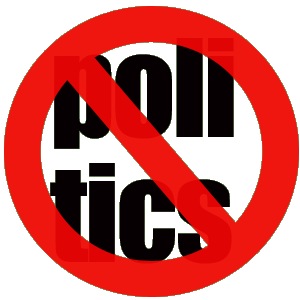
I should also point out that some of my bias against politics may also come from having grown up in Louisiana which does not have the cleanest of reputations when it comes to politics. I definitely have a trust issue with most politicians. I guess that’s a prejudice I need to work on.
In Romans 12:18 Paul writes “If it is possible, as far as it depends on you, live at peace with everyone” (TNIV).
Politics really makes this difficult. Take for instance my own very minor foray into politics this year. I’m president of my homeowners association. I did not want to run, but I was asked to run, and I did so with the intent of trying to help my neighbors. But then ethics (of all things) got in the way. And in trying to do the right thing in a handful of situations, I have for the first time in my adult life (or at least back as far as 7th grade) a handful of people who just hate my guts. There’s no reasoning with them. There’s no laying my gift at the altar to be reconciled with them (Matt 5:23-24). And I can forget inviting them to church or being any kind of witness for Christ to them. This small number of people--who happen to be my literal neighbors--wouldn’t give me the time of day.
Needless to say, I won’t be running again in February when we hold new elections.
Currently, there’s a group of ministers challenging the IRS’ regulations regarding pulpit endorsements (see Christianity Today: “Endorsing from the Pulpit”). I can’t say strongly enough how great a mistake this is. Christ did not call ministers to win political debates; he called them to proclaim the gospel and make disciples. The moment a minister endorses a candidate or publicly backs a political party, a certain segment of the populace--those who are of the other party or back the other candidate--will no longer listen to any appeal from that person to answer the call of the gospel. And all this over something which in the big picture is a tangental/secondary issue. In the end, the calling to ministry must trump one’s own political convictions and even national allegiances.
I’m not currently on a church staff, but at times whether I’m on one or not, you will never see a political sign in my front yard (if I had a front yard) or a candidate’s name on the bumper of my car. I know that the moment I back a candidate, I’ve lost any potential Christian witness with anyone on the other side. That’s my conviction; I’m not saying it’s prescriptive for you. I’m not going to do anything to mix those messages.

I’ll be honest though--I used to be a Republican. But I was strongly turned off to any association with political parties in the late nineties when a particular individual of one party committed a seriously heinous act. The act was bad enough by itself, but I watched in disgust as his political enemies of the other party went after him in an entirely inappropriate manner. It was their rhetoric and their hypocrisy (I assure you that I’m making correct use of that word here) that was my final straw. In the end I decided to have no affiliation with either Republicans or Democrats.
You stay with your convictions, and I won’t try to convince you otherwise, but out of my own convictions, I’m “none of the above”--I’m registered as an Independent. I occasionally run across someone who mistakenly believes that there is an “Independent Party.” That’s not the case, but if there ever is one, I will have to register as something else all over again.
And forgive me for over-spiritualizing the subject, but there were political parties in Jesus’ day and he did not choose affiliation with any of them either. That alone is worth some time spent in contemplation.
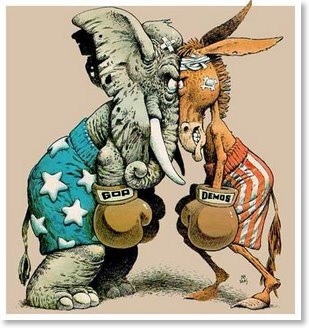
In regard to this year’s election, I’m part of that 15-20% “undecided” group you keep hearing about on television. I’ll tell you up front that in the past I’ve primarily voted fairly conservatively, often for the Republicans. And often this has been based on trying to wrap my conscience around voting for someone who does not claim to be pro-life at some level. However, at the same time, I strongly resent having the choice of my vote reduced to that one issue (and maybe one or two more). Plus, I feel a bit used by the politicians on the right who make this an issue only at election time and ignore it during the four intervening years. It makes me wonder if I should even let this become an issue since it hasn’t overtly seemed to matter one way or another after the election is over anyway.
I wish my friend Andrew was still with us, because although morally conservative, he had the political acumen to put the emotional, rhetorical and manipulative issues aside when choosing a candidate. I miss not being able to hash through some of the issues this political season with him.
I have to consider a number of other issues affecting our world today. Although the war in Afghanistan made logical sense, I never felt the same way about the war in Iraq. When the US made the decision to invade Iraq, I said at the time in the classroom (I was teaching high school then) that I felt this conflict met no criteria of classical “Just War” theory in any sense. And I still feel the same way. I voted for Bush twice, so I believe I have the right to be critical of him, but I believe he’s turned into a bit of a warmonger, and that’s not what I want in a president.
Our troops are undeniably stretched too thin with current involvements. We are not in a position to police the world, and we are spending money to the neglect of our own immediate needs and incurring a debt that will take decades to pay off.
By way of illustration, where my convictions are solidly more left-leaning has to do with health care. We have far too many people going without needed medical treatment in our country today and frankly, it’s shameful. There’s an individual in my family who, although he makes a decent living, works hard with two jobs, cannot afford health insurance. Because he’s diabetic, his insurance would cost over $800 a month and he simply can’t afford it. He often opts not to go to the doctor when any normal person would because he cannot afford it. When an illness becomes serious enough and he has no other choice, he often has to barter goods and services for his payment. This embarrasses him and it puts his doctor in an awkward position. He is one medical emergency away from a severe personal and financial crisis. I can also point to people I know in my church who have not been able to afford medicine their doctors had prescribed for serious ailments. Members in our church have been able to help some, but this isn’t a solution for the nation.
If the United States were a third world country (current economic crisis aside), I might feel differently, but I really believe that no one in our country should go without healthcare. And if we can spend $10 billion each month in Iraq, one would think we could spend significantly less to take care of those who are unable to afford decent medical treatment.
I also want a president who is going to take our environment seriously. In the end, global warming may become the ultimate “pro-life” issue, but too many people are not willing to take it seriously. By the time they do, it may be too late. It may already be too late if recent concerns are warranted.
Education policy is another hot button issue for me. I used to teach high school and my wife currently teaches in a public elementary school. I challenge you to quickly find any public school teacher who has been supportive of Bush’s “No Child Left Behind” policy. It sounded good in presentation, but it’s been a joke and a disaster in implementation. It actually penalizes schools that often need the most help. I’m very interested to hear the plans of both candidates on this subject, but most teachers hope that the next presidency--regardless of who wins--will bring an end to the current education policy.
Understand I’m not giving either candidate the actual label evil, but for me this election may come down to choosing the lesser of two.
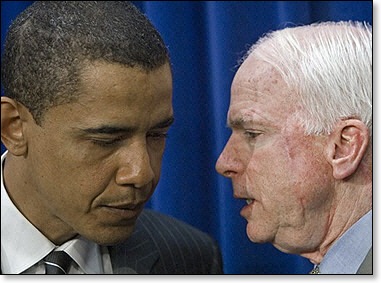
In our modern media driven era, the prettiest candidate wins (and no, I’m not referring to Palin). What this means is that in our media-driven culture, the candidate with the most charisma, the one who comes across best on television always has the advantage. One of my political science teachers in college twenty years ago pointed this out and I still believe he’s right. He pointed to the first televised presidential debate in 1960 between John F. Kennedy and Richard M. Nixon. Kennedy came across as young, calm, and relaxed while Nixon seemed uncomfortable, a bit nervous, and was sporting a very real 5 o’clock shadow. Kennedy’s supposed advantage had nothing to do with the content of their arguments. In fact, from what I’ve read, people who listened to the debate on the radio thought that Nixon won. But people who saw the debate on television thought that Kennedy won.
And guess which medium rules our day? I’ve even heard some speculate that if Lincoln and Douglas had been holding their debates today, there’s no way Lincoln would win because he was not all that charismatic in person. But in their day, more people read the debates than saw them in person.
Think about candidate pairings in the past: Carter vs. Ford, Reagan vs. Carter, Reagan vs. Mondale, Bush vs. Dukakis, Clinton vs. Bush, Clinton vs. Dole. In any of these pairings it’s easy to pick which of the two had more charisma and which looked better on TV--and that person won. Where we’ve had very close elections, we’ve seen pairings in which neither individual necessarily trumped the other when it came to charisma or presence on television (Bush vs. Gore and Bush vs. Kerry).
I’m not sure the GOP always understands this. For Republicans, it seems that a politician can “earn his turn” to run. This happened with Bob Dole. I liked Dole and I voted for him, but I knew even then he was not going to beat Clinton. And now it’s McCain’s “turn” because he’s at an age where it’s now or never. However, if Republicans had been better in tune with the power of media, someone like Mitt Romney would have had a much better shot at beating Barak Obama than John McCain ever will.
Barak Obama is not the most charismatic candidate to come along in recent years, but he has charisma nonetheless, and he’s well spoken. McCain comes across as stiff and fidgety, and often looks like he’s wearing the wrong size sport coat. I can certainly see why he’s trying to stall on the debates because even if he were to present a platform that was more sound, the visual appearance of the event will undoubtedly give the nod to Obama.
Both candidates chose running mates that were the opposite of the negative impressions people had of them. But in the end the vice presidential candidates don’t make final impression in the minds of the people. And contrary to what some people are saying, Hillary Clinton backers are not going to support McCain simply because he has a woman as his running mate. Hillary Clinton has more in common with Barak Obama than with Sarah Palin; and so for most of them, it will also be a “lesser of two evils” decision.
Finally, polls don’t amount to much. Polls are the record of a small amount of people who were willing to answer the pollster--which is not a lot of people. If you call my parents’ house to ask them who they are going to vote for, get ready for a lecture on how voting is private and that’s none of your business. If you call me... well you can’t call me because I only have a cell phone and that number’s unlisted. And if you did reach me to take a poll, I’d probably tell you I’m too busy.
I really am undecided as to who I will vote for. I signed up for updates on both candidates websites--something I’ve never done before, and it’s been interesting to have them both vying for my attention. Both send me emails. Obama sends me text messages to my iPhone; McCain sends me stuff in the postal mail. If I were to vote for Obama, it would be the first time I’ve ever voted for a Democrat for president. But I also admit that I could still vote for McCain based on certain moral positions.
On the other hand, I could always vote for McCain for the sake of conscience, knowing full well that Barak Obama is going to win anyway.
All of the images in this post were shamelessly lifted from other websites.
Are We Nearing a Full Blown Depression?
“O that my head were a spring of water,
and my eyes a fountain of tears,
so that I might weep day and night
for the slain of my poor people!”
(Jer 9:1 NRSV)
Housing bust, record foreclosures, out of control gas prices, job losses, major financial institutions going under. Really, in my 40 years I’ve never seen anything like it. This was a topic of discussion with my students before our class last night, and I made the statement, “It seems as if we’re nearing a full blown depression.”
Very quickly, one of my students shot back, “Well, you’re the only one to admit it!”
When I asked her what she meant, she said, “All of the politicians on television refuse to even admit that we’re in a recession when everyone knows we are.”
She’s right of course. This election year I’ve been on the email lists of both Barak Obama and John McCain. Obama sent out an email today referring to the situation as “our financial crisis.” Yesterday, McCain referred to “these tough times.” Bush says we’re in the middle of an “economic slow down.” No one wants to use the “R” word and certainly not the “D” word. This is an election year, after all.
The New Oxford American Dictionary defines recession as “a period of temporary economic decline during which trade and industrial activity are reduced, generally identified by a fall in GDP in two successive quarters” (a depression is simply defined as “a long and severe recession in an economy or market” ). So I don’t know if the situation meets this actual criteria but I know times are difficult economically, and I don’t yet see any indication that the immediate future is brighter. I’m generally not a doom-and-gloomer, but I really believe we should be prepared for potentially worse days ahead.
Flipping through the pages of the Renovaré Spiritual Formation Bible, my eyes happened to stop on the note accompanying Jeremiah 9:1. As you read the words below substitute in your mind the word politicians in place of kings.
“Grief is a prophetic activity. Kings put a happy face on everything, tell the people this is the best of all possible worlds and they never had it so good. It takes a truthful prophet to have the guts to grieve societal disaster. Tears are a sign of relinquishment, a letting go of false hopes and false gods, an admission that we are in sad shape and need of deliverance. The community that is faithful to the truth is always the place where we go to grieve, where we are given the space and permission to weep. Grief is not the final prophetic act, but it may be the first--an honest admission that we are a people who need a God who loves and saves. Tears are thus a prelude to openness to the possibility of divine deliverance.”
The Problems with Polls
A Guest Blog by Andrew Wells
No doubt we will be hearing a lot about polls between now and the November elections. I’m already reading about polls concerning the 2008 elections.
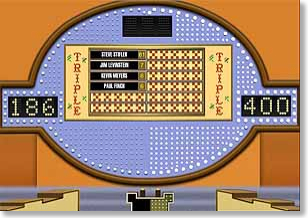
How can the opinions of a hundred or a thousand people correctly represent the millions of people in this country, or the billions of people on this planet? It’s just not possible.
But there are other things that bother me about polls. Consider the words of David Mamet, who wrote an essay called "Poll Finds" nearly twenty years ago, when polling wasn’t as ingrained into the culture as it is now:
We know that polls are inaccurate and unjust. We are drawn to them not because of their ability to predict the future, but because of their ability to relieve us of the responsibility of individual thought...the person who answers the poll has no responsibility, they are asked how they feel at any given moment.
I believe that most people are savvy enough today to take any poll with a grain of salt. But we let the polls become self-fulfilling prophecies. For example, we hear enough polls about what voters want to hear, and the next thing you know, candidates are talking about those issues. There is a new book by Joe Klein called Politics Lost that argues that polls and the consultants who interpret them have derailed our entire voting process. Mamet argues that saying a "poll finds" can also mean a "poll rules; i.e., it proclaims what the majority of people are thinking or should be thinking. And because we don’t like "the responsibility of individual thought"--which could lead us to look unpopular against the crowd--even though we don’t believe in the polls, we accept the results as current truth, as what the majority of people think.
But again, consider: "A poll can only discover what the polled believe at that instant to be true. The difference between what many people believe to be true and what may in fact, be true is often and perhaps most times vast."
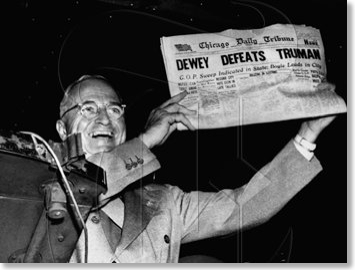
Andrew Wells can be reached at arwell012002@yahoo.com.
One last comment from Rick: I can't help adding to Andrew's post the words of Jesus in Matthew 11:19 (as rendered by Eugene Peterson):
"I came feasting and they called me a lush, a friend of the riff-raff.
Opinion polls don’t count for much, do they?
The proof of the pudding is in the eating."
(Matt 11:19, The Message)
About $1,400
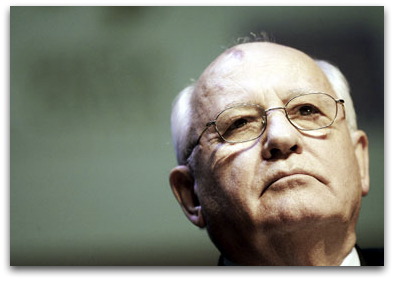
$1,400--that's the monthly pension that Mikhail Gorbachev, former leader of the Soviet Union receives per month from his government. Technically, it's 40,000 rubles, but $1,400 to you and me. And to think of that as a yearly retirement, that's $16,800 a year!
This information comes from the April 9, 2006 issue of Time Magazine, in a mini-interview, "10 Questions for Mikhail Gorbachev."
The most interesting question in the interview is Gorbachev's take on the economic difficulties faced by those living in the Russian states today. In answer to the question, "What is the root of the current difficulties in the lives of many Russians?" Gorbachev places the blame squarely on the shoulders of his successor, Boris Yeltsin:
Yeltsin ruined the country. He allowed the wealthy of the country to be taken by a few people. And the West was never critical of Yeltsin. I think President Vladmir Putin is correcting the mess that Yeltsin made.
Fascinating stuff. But I still can't get past his pension of $16,800 a year.
I couldn't remember, so I looked up the pension amount we give our former presidents. We haven't always provided for our former leaders, but the practice began in 1958 when Congress passed the "Former Presidents' Act" on behalf of former President Harry S. Truman who was in such bad financial shape that he and Bess Truman had to move into his mother-in-law's house after his term as president ended.
Currently we pay our former presidents $157,000 a year. Not too shabby compared to their Russian counterpart. If you're keeping track, this amounts to a little over $13,000 a month, somewhat shy of Gorbachev's entire yearly salary.
But it doesn't stop there. We also provide our ex-presidents lifetime healthcare and even free postage. Oh, and each former president presents a budget to the federal government each year to cover office equipment, travel and other expenses.
Now, I'm not saying that we shouldn't do that. We certainly wouldn't want any of our ex-presidents to live in poverty. However, consider that our former presidents do have other forms of income. At one point former president George Bush was making $4 million dollars a year in speaking fees. If you want Bill Clinton to address an audience, get ready to pay $100,000 or more. And of course, don't forget the multi-million dollar book deals. I don't begrudge anyone making money, but this is a far cry from Herbert Hoover, who refused his president's salary after making a fortune as a mining engineer. See "Too Rich a Deal for Ex-Presidents" for more information.
According to the Time interview, though, Mikhail Gorbachev has taken a cue from his American counterparts. The 75-year-old Gorbachev's newest book is entitled To Understand Perestroika. I hope it will sell well for him.
One final note. It's hard for me to think about Gorbachev and not remember the book given to me at the 1988 Christian Booksellers Association, Gorbachev: Has the Real Antichrist Come by Robert Faid.
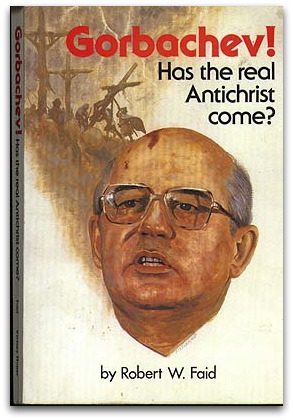
I guess Faid was wrong, wasn't he? I didn't doubt that then of course either. But I've always held onto this book as an example to show to my classes as to why to avoid the latest sensationalistic attempt at identifying predictive prophecy with exact figures of current events.
Politics Test
| You are a Social Moderate (56% permissive) and an... Economic Moderate (55% permissive) You are best described as a:
Link: The Politics Test on Ok Cupid Also: The OkCupid Dating Persona Test |
For the record, I'm registered as a political independent, and I tend to vote fairly conservative. Maybe I'm just a lot more reasonable than some of you thought. Or maybe I'm just sitting on the fence for too many things!
See how you score (but don't register for that silly website), come back here, and leave your results in the comments.
Harriet Miers Withdraws Her Nomination to the Supreme Court
Released from the White House this morning:
President's Statement on Harriet Miers' Supreme Court Nomination Withdraw
Today, I have reluctantly accepted Harriet Miers' decision to withdraw her nomination to the Supreme Court of the United States.
I nominated Harriet Miers to the Supreme Court because of her extraordinary legal experience, her character, and her conservative judicial philosophy. Throughout her career, she has gained the respect and admiration of her fellow attorneys. She has earned a reputation for fairness and total integrity. She has been a leader and a pioneer in the American legal profession. She has worked in important positions in state and local government and in the bar. And for the last five years, she has served with distinction and honor in critical positions in the Executive Branch.
I understand and share her concern, however, about the current state of the Supreme Court confirmation process. It is clear that Senators would not be satisfied until they gained access to internal documents concerning advice provided during her tenure at the White House - disclosures that would undermine a President's ability to receive candid counsel. Harriet Miers' decision demonstrates her deep respect for this essential aspect of the Constitutional separation of powers - and confirms my deep respect and admiration for her.
I am grateful for Harriet Miers' friendship and devotion to our country. And I am honored that she will continue to serve our Nation as White House Counsel.
My responsibility to fill this vacancy remains. I will do so in a timely manner.
___________________________________________________________________________
This was the right decision, and one that can save face for everyone involved because it was done before Ms. Miers was scheduled to appear before the Senate. Although the official reason for the decision will remain the confidentiality issue (attorney-client privilege) regarding Ms. Mier's role as legal counsel for the President, the real reason is mounting criticism over her nomination, even from within the President's own party.
I don't doubt Harriet Miers qualifications as the President's legal counsel, but as I expressed in a previous blog entry , I had become convinced like many others that she was not the best choice for the Supreme Court nomination. That's not a criticism of her; it's just reality. And I have no doubt that she is a fine person of faith, but that simply wasn't enough. There are lots of things that I am not qualified to do, even within my areas of experience and specialization. The same goes for everyone.
Had Miers' confirmation gone through (and like many, I'm not positive that it would have) every decision that she wrote or commented on for the rest of her career on the Court would have come under incredible scrutiny and criticism, undoubtedly unfairly at times. Who would want to live in that kind of a fishbowl? Her withdrawal was the right decision on both a personal and professional level.
There's always the old analogy that if you had to have brain surgery, would you rather have an outstanding surgeon with a high success rate who also happened to be an atheist, or would you want a mediocre surgeon who would pray with you before the procedure? Personally, I'd rather have the outstanding atheist surgeon and I'll pray ahead of time myself!
However, if you can find an outstanding surgeon who will also pray for you, that's the best of both worlds.
And that's what the President needs to do. He needs to nominate an outstanding candidate, competent in Constitutional law, who is also a reasonable conservative and person of faith.
The Harriet Miers Question
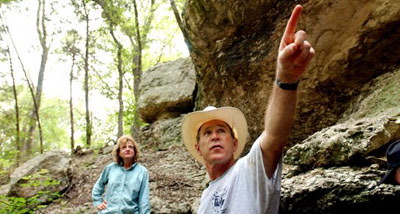
President George W. Bush tours a canyon with White House Staff Secretary Harriet Miers at his ranch in Crawford, Texas, Friday, Aug. 9, 2002.
To say that George Bush's nomination of Harriet Miers for the Supreme Court was a surprise would be an understatement. I even wondered to myself if Bush purposefully nominated someone whom he thought would not be affirmed so that a better candidate might have an easier time of it afterwards. This, of course, assumes that regardless of who had been nominated after Roberts would face stiff opposition.
Like you, I've heard many voice their opinions for and against Ms. Miers, but I really haven't had much of an opinion other than to think that perhaps a better candidate could have been chosen by the president.
Then today, I read Douglas Groothuis' reasons as to why he's "Against Harriet Miers for the High Court."
I have to say, I think he's right...
The Coming Conflict with China
You may or may not have heard about the threats that China's General Zhu Chenghu made toward the United States two weeks ago (go to any of the news sites and search for articles with "Chenghu" around July 15 or 16). The reports received mixed coverage by the mainstream media with some barely covering it at all.
In a nutshell, Chenghu said that if the United States was to interfere with China's attempt to reconsolidate (i.e. invade and conquer) Taiwan, they would be forced to use nuclear force to stop us. Further--and you're going to think I'm exaggerating this, but I'm not--Chenghu said that they would fire missiles at hundreds of US cities! That story came out on July 15, and the next day the Chinese government said that Chenghu's statements were his own, not official government policy.
But think about this! Can you imagine if one of our military leaders was going around making statements that we were going to use nuclear force against other countries? He'd be canned immediately. No such reaction from China toward Chenghu. I've no doubt that a Chinese invasion of Tawain is imminent--as in any day over the next few months. And no doubt, Chenghu has been part of strategy sessions where the question has come up as to what the response would be if the United States interferes. I think we'd better take his comments, regardless of the context, pretty seriously.

What all this means is that when (notice I didn't say "if") China invades Taiwan the United States is going to be obligated to come to the defense of this nation that it considers an ally (but doesn't officially recognize as an independent nation) against a nation that it officially recognizes as a nation (but doesn't consider an ally). And when you think that just two weeks ago a general in China's army says if the United States interferes (assumption: militarily), they will use nuclear force against us in retaliation, you have a pretty serious setting-up of events!
Heaven forbid that there's ever a World War III, but if there is, look for it to be primarily the United States against China. My fear is that the stage is being set for a major showdown between these two countries that makes the Cold War of the 20th Century with the USSR look like field maneuvers and the current War on Terror as merely boot camp. Regardless, China is set to be the major world power of the current century and by the end of it, could very well be a greater presence than we--the United States--are now.
I had an informal conversation with a world religions professor (it's probably best to leave him anonymous) regarding China ten years ago. In that conversation, he said that it's speculated that China is sitting on the largest untapped oil reserves in the world, biding their time in hopes that another primary fuel source doesn't emerge before the rest of the world runs out. At that point, they could control the world's fuel supply and thus, the world's economy. Think about how frustrated you are paying higher gas prices lately because the Middle Eastern OPEC nations control the cost of crude oil. It could get much, MUCH worse.
This same professor also said that basically, China has never been a key player so far in world events because with their own wars and such a huge population to contend with, they effectively sat out the Industrial Revolution. However, he noted that they are now in the process of catching up overnight. I think they've caught up.
On the positive side of things, if relations with China were to go well over the next few years, there is unlimited opportunity in the areas of trade and foreign relations. A student graduating from high school or college today who takes the time to learn Mandarin Chinese (the most spoken language in the world; English is second) could effectively write his or her own career ticket.
However, if things do not go well, we could be facing an enemy the likes we've never known. With the kind of threats being made by someone up so high in China's military, my fear is this is the direction we're heading. Let's pray that is not the case
You heard it here first...
Colin Powell's Departure: Not a Surprise to Some
My Dad is in the men's clothing business--always has been. I grew up with magazines like GQ lying around. After I was out on my own, I still got my issues of GQ--not that you could tell by the way I dress. Who could afford that stuff? But Dad still buys me the subscription every year for Christmas. I have to admit that some stay in the plastic, but I always scan the cover for the major articles. The fashion trends don't interest me that much to be honest. But the occasional political article, the bio on this or that Hollywood director, or the piece on some new cultural trend often catches my interest.
When I received the June, 2004 issue (in May), I immediately opened it because of the feature article on Colin Powell. The article described his frustration with Bush's administration, how he felt used for being asked to make the case against Iraq before the UN now that it seems the intelligence was faulty. It mentioned that he might not stay for both terms if the President won reelection.
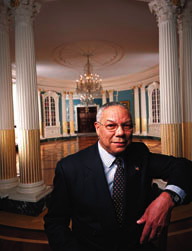
Now, I've heard said in response to this that it's not all that abnormal. For instance, I've been told that almost no one in Reagan's cabinet stayed for the entire two terms. But those members shuffled in and out over the course of eight years. Is there any precedent for so many leaving all at once? Some of you are better students of political history than me. Please chime in what you know.
Nevertheless, the article from GQ gives some great insight. The writer also interviews Condoleezza Rice, which is now even more interesting since she's been tapped to take Powell's place. Don't discount the source because of the magazine's other content. Read it for yourself. Download the Adobe Reader file below. Then, hit the comments button below and let me know what you think.
Final Thoughts on the 2004 Election (And a Couple of Predictions for the Future)
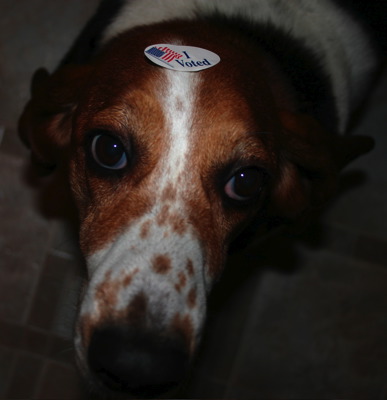
______________________________________________________________________________
I made three predictions about Tuesday night's election and I believe they all came true.
1. Bush won. Yes, I know I didn't publish that one, but it was the third prediction, and a number of you emailed or called me to find out what I thought--so you can vouch for me.
2. Voter turnout was extremely high. In fact, it was the highest on record since 1968 (the Humphrey/Nixon race).
3. The race was not nearly as close as the polls were showing. Iowa is the last straggling state to report it, but it looks like their seven electoral votes will go to Bush (not that it matters much at this point). So that makes 286 electoral votes for Bush and 252 for Kerry. Or you can look at it as 53% for Bush and 47% for Kerry. That's a LOT more than the 1% difference, neck and neck races that the pollsters were reporting. Told you so, told you so, told you so. Okay, I'll be fair. The popular vote was slightly closer with 51% voting for Bush and 48% voting for Kerry. Either way, though that's still not as close as what people were reporting even as recently as Election Day, November 2.
Of course, I believe we should go by the popular vote and completely do away with the Electoral College. I don't think the Electoral College is needed in the modern world, and I have yet to hear of a convincing reason why we should keep it. If you disagree, leave a comment below and try to convince me otherwise.
The other surprising thing that came out of this election is that voters' number one concern was moral issues . Exit polls showed that voters were concerned about moral issues in choosing their candidate over issues such as the economy and the war on terror. Further, of those who were most concerned about moral issues, 79% voted for Bush over Kerry.
Funny that Kerry was not associated with moral issues. I'll be the first to admit that Bush is not my "most favorite" president of all time, but Kerry is a total secularist (despite any stories he tells about being an altar boy and going to mass regularly).
If you remember, I wrote in a previous blog about the vote held in Louisiana earlier this year to restrict the definition of marriage through a constitutional amendment to one man and one woman. Despite what you hear about New Orleans, the vote was an overwhelming 80% in favor of keeping a traditional definition of marriage. When I wrote that blog, I said that I wanted to see other states do the same thing because I was convinced that the vote would be similarly overwhelming elsewhere. In Tuesdays election, there were 11 states that had amendment proposals to ban homosexual marriage. I've had a hard time finding one source that put all the totals on this together, so I've compiled my own:
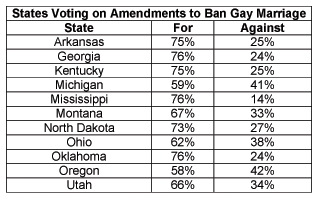
State amendments such as these are a good stop gap measure, but I believe that ultimately, we need a Constitutional amendment to keep states such as Massachusetts or even California from going against the national flow and redefining marriage on their own.
Moral issues such as homosexuality, abortion, and even the war on terror are important, but if I may add, we need to be careful as a society not to neglect the needy who do still exist for a variety of reasons. For those of you who are Christians, make sure you remember this. Reread passages such as Galatians 2:10 and Matthew 25:31-46 just in case.
Two Predictions for the Future:
1. In 2008, Democrats are going to try to find a candidate not quite so far to the left. Heck, Kerry was so far to the left that he made Clinton look like the moderate he claimed to be. I don't know what that means for Hillary since she is both further to the left than her husband, and like Kerry considered a northeastern elite.
2. Despite a Republican majority in both the House and the Senate, Bush is not going to have the free ride making policy that you might think. There are a number of Republicans who have serious disagreements with Bush. They kept quiet during the elections because they wanted a Republican victory. But the election honeymoon is not going to last long. In fact, by the time you read this, it may be already be over. Expect some resignations on Bush's cabinet and quite a bit more outspoken opposition from among the ranks.
As for the next election, I will vote for the candidate who runs on the promise to take down his or her campaign signs in a timely manner...
The First Time I Voted for President
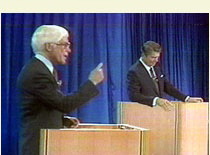
Well... there's the first time I voted, and the first time I legally voted. No, this isn't a tale from Florida. Rather, the year was 1980 and I was in junior high. We ran a mock election like a lot of schools do, letting all the students vote for president. I guess it brings chuckles to compare the votes of children to the actual votes of their parents.
They picked three of us to represent the candidates: Ronald Reagan (Republican candidate), Jimmy Carter (Incumbent Democrat candidate) and John B. Anderson (Independent candidate). I didn't know anything about any of the candidates except for Jimmy Carter who had been president for the last four years. They picked me to represent John Anderson, the Independent, and I faithfully went to the library to do my research so that I could make my two minute campaign speech before the school. I guess that was slightly prophetic, too, since I am an independent today.
After we all three made our campaign speeches, it came time for the vote. When everything was said and done, Anderson (who garnered 7 million votes in the actual election--not too shabby for an independent) got about half a dozen votes (I guess I probably had a few faithful friends). Reagan came in second and Jimmy Carter won in a landslide.
Our votes didn't reflect the way the nation voted at all, but the whole process was a lot of fun. It was the first time I ever paid any attention to a presidential election. I even felt like I had something at stake in it. Even if my candidate didn't win, I believed I was part of the process.
I still choose to be a part of that process, but today my vote counts for something. Yours does, too. On Tuesday, go exercise your American privilege and vote for the candidate of your choice.
Two Predictions Regarding Tuesday's Election
1. There will be more people voting this time than have voted in a very long time--maybe even record numbers. If we learned anything last time, it's that every vote counts. People are going to come out of the woodwork for this one. And in Florida, some people may even get to vote twice.
2. The race is not going to be as close as the polls are showing you on television. What do I mean by "close"? Well, last time it was close. It won't be that way this time. There will be a clear winner, in spite of the fact that polls seem to show them neck and neck. There are still a large contingent of people who will vote, but will not answer pollsters. I've heard them. They say things like, "Who I'm voting for is none of your business, thank-you," before hanging up the phone.
I'm not a professional prognosticator, but these are my predictions based on what I know and feel. We'll know whether I'm right, soon enough.
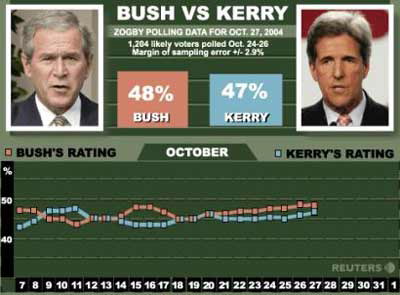
Above: Recent polls such as this one from Zogby show the candidates neck and neck.
I don't think it's anywhere near this close.
The Presidential Gang Sign

[Note: all the pictures below are genuine and have not been manipulated]
The thumbs-up sign has a long and debated history . Supposedly it goes all the way back to Roman times when a thumbs-down was used to spare a gladiator's life as a symbol for "swords down." In our culture, we use thumbs-up to mean something is positive and thumbs-down to indicate something negative.
For people of my generation, the first time we ever really paid attention to a thumbs-up came when watching Happy Days. Yes, we learned the thumbs-up from Fonzie. And here's how we learned it: the thumb should take--if not a 90°--at least a 75-80° angle from the fingers with the tip of the thumb arching slightly backwards:

But I've noticed that presidents and presidential candidates do the thumbs-up differently. They tend to lean the thumb forward at about a 45° angle, sometimes with the thumb actually touching the fingers. It's weird. It's freaky. It's obviously some kind of "Presidential Gang Sign."
I first noticed Clinton doing this. Okay...actually, I first noticed Darrell Hammond on Saturday Night Live imitating Bill Clinton's thumbs up.
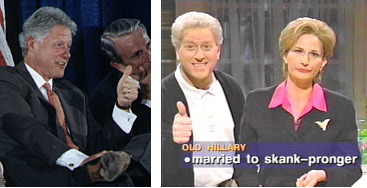
At first, I thought that the presidential thumbs up started with Clinton because I couldn't remember any president before him doing it. But there are lots of folks doing it right now.
Hillary does it:

George W. Bush does it...
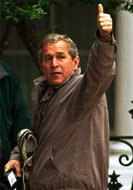
but guess who taught him...
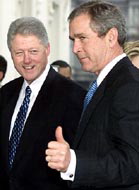
Kerry and Edwards are practicing it already:
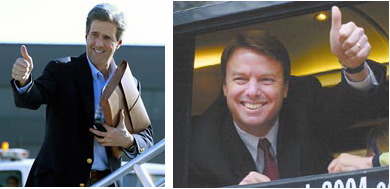
In fact, Edwards can't appear in front of a camera without giving the presidential thumbs-up. Watch him the next time you see him on television--he does it over and over and over.
So, anyway, I researched this thing. It was a burning question to me. Did Clinton create the presidential thumbs-up sign? I could find no pictures of George H. W. Bush, Ronald Reagan, Jimmy Carter or Gerald Ford making anything like this gesture. I was about to give up. And then I found it.
Here you go: the founder of Presidential Gang Sign:
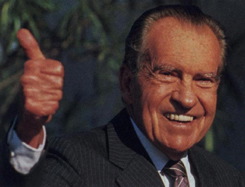
And you thought he only made the peace sign!
Who Is Really to Blame for 9/11?
In the news today was the report that our air defense system was unprepared for the September 11, 2001 attacks . Evidently there was a huge breakdown of communication between the Executive Office and our military even in issuing the order to shoot down the planes. By the time the orders were made clear, all planes had crashed into their targets (with the exception of the United Flight 93 that crashed in Pennsylvania).
Tonight's news showed family members of victims killed at the World Trade Center who wept over the fact that perhaps if communication had been better their loved ones might not have died.
Maybe...maybe not.
I certainly don't want to be insensitive to those who lost family members, but I think it's a bit presumptuous to make arm chair criticisms of the way things were handled after the fact. Certainly, it's come to light that our intelligence agencies were not in communication regarding pre-strike information. That should have been different, and I assume will be from here on out.
But I've been a bit bothered as I've watched some of the Independent Commission on the 9/11 attacks. I've felt that there was this overwhelming desire to find a scapegoat in all this--to find someone to blame.
Look...this event was unprecedented. We had never had anything remotely similar carried out in all of American history. It's hard to imagine how any previous administration would have responded.
Did everyone have all their ducks in a row? No. Will they be better prepared in the future? You bet. But all the preparation and communication in the world can't be 100% effective. Odds are--sad to say--that we will see this kind of event happen again, regardless of how prepared we are.
In the meantime? Do you really want someone to blame? Here's an idea... Why don't we blame the hijackers themselves? They did it. They are to blame. It's difficult because they are dead and we don't have them to stand trial and face the families of those who lost loved ones.
However, if it means anything to you, I can assure you that they are paying for it now...
________________________________________________________________________
And on a related note, this...
After getting nailed by a Daisy Cutter, Osama made his way to the pearly gates. There, he is greeted by George Washington. "How dare you attack the nation I helped conceive!" yells Mr. Washington, slapping Osama in the face. Patrick Henry comes up from behind. "You wanted to end the Americans' liberty, so they gave you death!" Henry punches Osama on the nose. James Madison comes up next, and says "This is why I allowed the Federal government to provide for the common defense!" He drops a large weight on Osama's knee. Osama is subject to similar beatings from John Randolph of Roanoke, James Monroe, and 65 other people who have the same love for liberty and America. As he writhes on the ground, Thomas Jefferson picks him up to hurl him back toward the gate where he is to be judged.
As Osama awaits his journey to his final very hot destination, he screams, "This is not what I was promised!"
An angel replies, "I told you there would be 72 Virginians waiting for you. What did you think I said?"
Doubtful About the Democrats
Realize that since I am neither a Democrat nor a Republican, I am speaking strictly as an outsider. But I've watched some of the debates among the candidates vying for the nomination of the DNC. I've been following the primaries. I've paid attention as the position of frontrunner was at first Howard Dean and--as of this writing--has shifted to John Kerry.
I, too, chuckled at what has now been called Howard Dean's "I have a scream" speech. Yes, it was a bit goofy. But what really got my attention was when I began to reflect on Diane Sawyer's charge in her interview with Dean that his speech did not seem very presidential (something to which he agreed).
Diane's right. It wasn't presidential. And then I started reflecting on all the candidates. None of them seem all that presidential. In fact, I can't honestly picture any of them in the Oval Office. Can you? Really? Come on...can you really picture Howard Dean as your president? Wesley Clark? John Edwards? Al Sharpton? Sheesh.
What does it mean to be "presidential"? Well, it means lots of things, but I think that ultimately it means a person has the ability to be taken seriously as the leader of the country. Real leadership is the key. To me, regardless of whether you like George W. Bush or even Bill Clinton before him, both of them had true leadership ability.
Of the democrats, it's hard to picture any of these guys (and I can say guys since Carol Mosely Braun dropped out), save one, making major decisions with wisdom and forethought. When Wesley Clark was a general, did he wear that silly grin even in the heat of battle?
The only candidate who comes off with any credibility (i.e. the only candidate I can really take seriously as presidential material) is Joe Lieberman, but he is in the single digits in the polls. Why is he not popular? He's not popular because like his buddy, Al Gore, he has no charisma. "So what?" you might ask. Well, in our visual (think television) culture, charisma is everything.
In fact, I think this is why Bush beat Gore, Clinton beat Dole and Bush, and Bush beat Dukakis. Do I need to take it back any further for you to see it? It applies at least back to Kennedy and the first televised debates. In our culture, the prettiest candidate wins--the one who comes across best on television. Granted, there are other factors--qualifications, state of the economy, platform promises, etc....but I believe charisma is the major factor in the voting public's mind.
So back to the democratic candidates--don't most of these guys--and I know this sounds mean--come across to you as a bunch of clowns? The current Bush and his father I could picture in the office. Even Clinton didn't defy the imagination for the position. But I can't picture any of these current contenders as president.
The buzzword I'm hearing right now is electability. That means the Democrats are trying to figure out, not which is the best candidate for the position, but which one has the best chance of defeating incumbent, George W. Bush. But you know what? I don't think any of them do.
What do you want to bet that George W. isn't losing any sleep these days?
-------------------------------------------------------------------------------------------------------
On another note, I've received mail from a number of you regarding yesterday's blog, "Smackdown in the Kroger Parking Lot." One of you had this to say in regard to my suggestion that we should all grab a loose cart and take it in when we go to the grocery store:
BTW, I've been doing just that for a couple of years. I love to get parked, jump out of my car and grab a cart and put it up while some idiot is still fumbling for their key, etc. After getting it back in the proper place for the carts, I love to glance at them and always hope they learned something. But mostly those type folks never learn. Some folks think the world owes them extra favors.
I will never forget the time I wouldn't let a little fellow drag a cart past my car. I told him I would take it because I didn't want to bump my car with it. He looked dumb but tried to be helpful and stated, "Ma'am, it won't hurt the car for it to get bumped." I informed him that most cars are very expensive and cost a minimum of $25,000 and that I did not want my car bumped or scratched with a shopping cart. And I don't think he got it. He will be 40 years old one day, make his final payment on a car and a grocery boy will try to drag one by his vehicle.......and a little light will go off in his head from 25 years earlier.
The Real Reason James Brown Has a Funny Haircut
I know I said I wanted to avoid a lot of the really personal kind of entries, but this is so funny (and obscure), so I have to share it. It all goes back to a dream I had a couple of weeks ago. This may give you some kind of weird insight into my psychological standing, and if so, keep your psychoanalysis to yourself.
Have you ever had one of those dreams that was so real that when you awoke, it took a bit before you realized it wasn't true? And then you were a bit disappointed once you really realized that? Well this dream was like this.
Most of you know that I am originally from Louisiana. In my dream, Arnold Schwarzenegger was running not for California governor , but Louisiana governor . And he approached me because he said he had read my blog and he liked some of my views. Now what you really have to realize that in the real world, I had not yet started writing this blog, but the idea was already in my mind.
Arnold told me that he wanted me to be his running mate--he wanted me to run for Lt. Governor. Of course at first I immediately said yes, not because I have any real political aspirations, but mainly because I thought it would be cool to get to hang out with Arnold Schwarzenegger . Of course after I accepted his offer, I began to think of reasons why I really shouldn't do this.
I told Arnold, "Now you realize that I am not a republican like you, in case you are assuming that." But to that he said, "We are building da platform of diversity" (and you really ought to hear me say this in Arnold's voice). And he went on to tell me that he was a bit further to the left politically than I was and he needed someone to help him gain the more conservative vote.
And then I started worrying because I realized there would be debates and press conferences and what if I was asked something to which I was just clueless? So I decided I needed a few platform sound bytes. My first one would be "As your Lieutenant Governor, I will seek to create new jobs and a thriving economy in Louisiana ." But then I thought, what if someone asks me how I was going to do that. I had no idea, so I decided my response would be "Next question?" Also, I would tell people that we needed to really emphasize tourism in the state once again because I felt tourism had been neglected. Again, what if they asked me how I was going to do this. I did not know what I was going to say and I was more and more concerned that I was just going to come across as a doofus .
I told Arnold about my worries and he told me not to worry... that "You will do fine" (again, you really ought to hear me do his voice).
Suddenly, as we were talking, in walked James Brown . Yes, the "I Feel Good !" James Brown. And I realized that he, too, was running for governor of Louisiana. Of course, that made him the enemy. I walked over to him to shake his hand and see if I could get a feel for whether or not he was any real threat against us.
When I greeted him, he said, "Hey, man, I need a haircut." At that point, I really didn't think he was a threat anymore because he thought I was a barber. So I told him to sit down in the chair in front of us, and I would cut his hair. Of course, you have to realize that I don't know anything about cutting hair. I wouldn't cut the hair on a dog!
And since I didn't know anything about cutting hair, I found a rather large bowl lying around and I put that on James Brown's head and I simply cut around it. He did question my method, but I told him it was the in-thing and it would make him cool with you younger constituents. Of course he looked horrible and I wondered how mad he was going to be once he figured out that he had been punked by his political rivals.
At that point in the fun, I woke up unfortunately. There's never good closure in my dreams because I always have to turn off the alarm clock or go to the bathroom at some point. But the dream had been so vivid that it was not immediately clear to me that it wasn't at all real. But once that truth settled in on me, I was greatly disappointed.
Now, I know nothing about dream interpretation, but if you do, I welcome you to take a shot. However, I do find two things about the whole thing rather interesting. First, when I had this dream I didn't have a blog and now I do. So what's next? Maybe politics is in my future, too? (Arnold, if you're really reading this, give me a call and let's have lunch next time I'm in Sacramento). And second, isn't it amazing how quickly I resorted to dirty politics (the whole bowl haircut incident on James Brown). What's up with that?!










